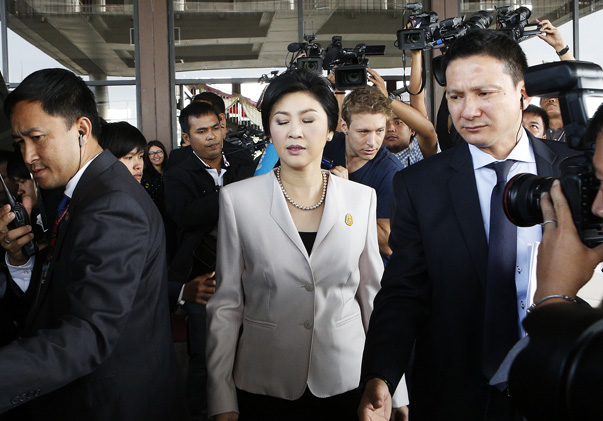Thailand's wandering prime minister
Temporarily homeless and dismissed by opponents as a “dim-witted puppet”, Yingluck Shinawatra seems determined to hold on to power in Thailand.
Every leader needs an office. British prime ministers have long claimed 10 Downing Street. The American president gets the run of the White House.
Here in Thailand, the top elected official is based in Government House – a pleasant Italianate construction in the heart of old Bangkok. But the Thai prime minister, Yingluck Shinawatra, has a problem. She cannot get anywhere near the place.
For the last couple of weeks, Government House and more than a dozen other ministries have been besieged by tens of thousands of anti-government protesters. It has been described as a symbolic occupation by the movement’s leader, a wily, silver-haired politician called Suthep Thaugsuban. He accuses Ms Yingluck of corruption and incompetence and he wants her (and her family) out of politics altogether.
The prime minister has tried to defuse the crisis by dissolving parliament and calling a new election, but those whistle-tooting demonstrators have not budged. There were 10,000 out last night, clinging to the streets and alleyways around Government House.
To get around the problem, Thailand’s 46 year-old leader has had do some serious office sharing. The wandering premier now splits her time between various police and army buildings. Her staff told me they wake up never knowing where they are going to be working that day.
We caught up with Ms Yingluck yesterday evening, along with a small number of other foreign journalists, in a room attached to a hangar at an air force base. The Oval Office it was not – but we did get a chance to ask her some questions, like why had she not ordered the police to clear demonstrators out of various ministries and her own government headquarters?
The prime minister said: “The first thing we have to think about is the human rights. We have to make sure that we handle the protests (according to human rights and) are peaceful. The second thing is that we have to stick with the principle of the rule of law.”
This ‘non-confrontational’ policy may sound virtuous – but it is also practical. Throughout the crisis prime minister Yingluck has tried hard to sound reasonable. She says she is open to negotiation – to a referendum on political reform – and she has committed herself to the democratic process.
She does so in the knowledge that she is supported by the electoral majority, by the rural poor from the north and northeast – and she has her brother Thaksin to thank for that. He served several terms as prime minister, introducing wildly popular programs like affordable health care and guaranteed crop prices, before he was ousted in a coup in 2006.
On the other hand, the protesters, who are largely made up of Bangkok’s educated elite and middle class, seem to have lost faith in democracy. Instead of calling on their leaders to come up with election pledges that are attractive to the nation as a whole, they want to overthrow the system.
Indeed, Mr Suthep’s proposals seem rooted in earlier and less savoury times. He wants a non-elected council of ‘decent men’ to run the country. He has called for a shadow system of volunteers to replace the police and he wants the elected Prime Minister prosecuted for insurrection. It is the sort of ‘reform package’ that the international community will run a mile from.
I asked the Prime Minister what she made of Mr Suthep’s proposals and she said: “But in the real world how can we make this new system work? Everybody in every country follows democracy. (But what he wants) is a new system. That hasn’t been (approved) in the constitution. Who is going to accept Thailand if we endorse (these) laws?”
As for Ms Yingluck, one major question hangs over her. Who is the Prime Minister? Who is in charge? Does the divisive Mr Thaksin, now exiled in Dubai, run the government – or has she taken control? Anti-government protesters think they know the answer. It has been scrawled on posters and screamed at the top of their lungs for weeks. “Toxic Thaksin” is the boss, they shout, and his sister is the “dim-witted puppet”.
At the air force’s ‘oval office’, I met a woman who seems to have taken it personally. “I think one thing is that now we are playing politics too much. (It) makes a lot of Thai people confused.” She continued, her voice quivering with emotion.
“I was born in the countryside and you haven’t had a chance to talk to (rural people). They’re just doing (their) work to get money day by day. No one listens to them. I (was elected by) 60 million people. No one listens to (them).”
Yingluck Shinawatra seemed determined to remain the prime minister and it sounded like she wanted some respect. I got the feeling that she will continue to wander between police stations and army barracks until she gets it.
Follow @c4sparks on Twitter.





